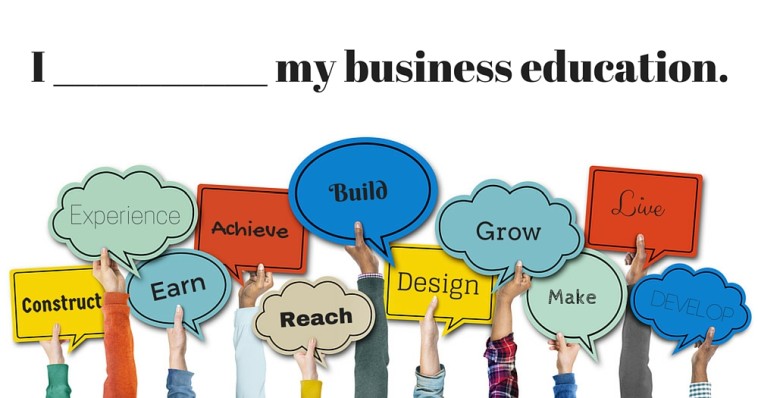
I’ve written lots of blog articles about business education, and I’ve spent lots of time trying to find the right words to describe the process of educating oneself using MOOCs and other new tools.
I must say, I am downright frustrated with the limitations of the English language when it comes to talking about education.
What do I mean?
I’m talking about the fact that the three most common verbs used in conjunction with education are the three least descriptive, most boring verbs in English.
Go. Do. Get.
A student goes to a university.
She does an MBA.
She gets a degree.
These words completely hide the richness of the educational process. Not only that, these verbs are awkward when it comes to talking about an education that doesn’t result in a degree, or that isn’t administered by an institution.
Do, go, and get are bound up with the idea that education is a thing. You go to a place, do some tasks that are assigned to you, and you get a piece of paper that is commonly recognized to be a valuable signal of your preparation. That’s education in a nutshell, right?
Well, I’m here to challenge these verbs and the idea of education that is encapsulated within them. I would like to propose three new verbs (and some related synonyms) to talk about education not as a thing, but as a process in which the learner is an active participant, not a passive recipient.
EXPERIENCE. BUILD. ACHIEVE.
Education isn’t about GOING to a university; it’s about EXPERIENCING transformation.
The word GO fails to capture the richness of transformative education. You don’t just go, you BECOME someone you weren’t when you first showed up for your education. You ARRIVE at a destination, though not necessarily a physical one. GO misses the moments of inspiration and insight that occur, the relationships that form, the horizons that open up as a result of education. You don’t just GO to school, you LIVE through an educational experience. Education ACTIVATES you. You CHANGE, GROW, TRANSFORM, and EVOLVE.
GO is also inadequate given the fact that contemporary education doesn’t require you to go anywhere in particular. Going to Harvard sounds cool, but to my mind, EXPERIENCING Harvard sounds even cooler. And new technologies are making that possible. Watch this video to see what I mean.
Rather than DO a degree, why not BUILD a body of knowledge?
Of course, when you undertake an education, you are DOING something. But what are you doing exactly? In Spanish, ‘to do’ and ‘to make’ are the same verb. In the case of education, I think the word MAKE is a much better translation. Education is something that the learner CONSTRUCTS inside his or her head. Education has to be FORMED, DEVELOPED, CULTIVATED.
Knowledge is BUILT not received. Therefore, I’m not just DOING an MBA or its equivalent. I am CONSTRUCTING a set of skills and knowledge, DESIGNING projects to solidify my learning, CRAFTING the education that is most valuable and relevant to me.
Instead of GETTING an education, how about ACHIEVING education, understanding, or even mastery?
GET is the worst. GET makes it sound like your education is simply handed to you. Or as if education is something you can buy, like a product in a store. But as any serious student knows, education can’t just be exchanged in a monetary transaction. By the same token, real learning can most certainly take place in the absence of a transactional relationship. Who’s to say that Josh Kaufman’s book-based education is any less valid than a business degree that another person paid $150,000 for? Is it the transaction that makes it count? I don’t think so. GET makes it sound like a sale or deal is the only path to learning.
Instead of GETTING an education (or TAKING a course), wouldn’t it be better to ATTAIN, ACCOMPLISH, EARN, REACH, or ARRIVE at an education?
Which words do YOU use?
In my No-Pay MBA, I’m not just GOING online to take some courses and GET a few certificates. I’m not just DOING a replica of an MBA.
I’m actively BUILDING new skills and knowledge, EXPERIENCING a transformation in the way I think about business, and ACHIEVING mastery across a variety of business disciplines.
What about you? What verbs do you use to talk about your education?



